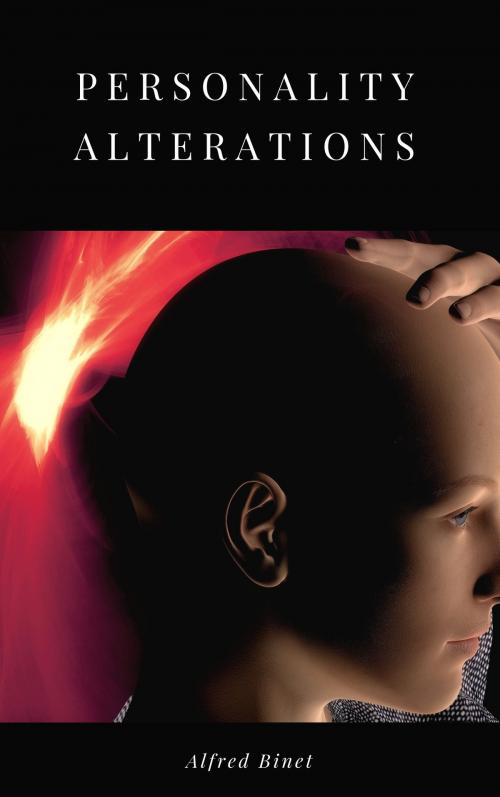| Author: | Alfred Binet | ISBN: | 1230003208847 |
| Publisher: | Guy Deloeuvre | Publication: | April 29, 2019 |
| Imprint: | Language: | English |
| Author: | Alfred Binet |
| ISBN: | 1230003208847 |
| Publisher: | Guy Deloeuvre |
| Publication: | April 29, 2019 |
| Imprint: | |
| Language: | English |
It has been fifteen years since research in pathological psychology began in France, England and a few other countries, based on the study of hysteria and suggestion; we all know how ardently physiologists and philosophers have engaged in this new study, and in a very short space of time a really considerable amount of observations and experiences of all kinds have been collected; hallucination, paralysis by suggestion, personality alterations, memory disorders, muscle sense, suggestions during waking and hypnosis, unconscious suggestions, etc., these are the main issues that have been examined and thoroughly researched.
As research multiplied and expanded, there were many discussions among the experimenters; not only were there no agreement on the theories, but important facts asserted by some were denied by others; there was even a rise from school to school. The controversies, which may have been regretted, but which, in short, are constant and even necessary in any new research, have cast some doubt on the true value of the materials collected.
My intention in writing this book is not to continue the tradition of school discussions; instead of opposing my experiences to those of the other authors, I will take as a whole all the results that have been obtained in the study of a question, to search for which of these results are those that agree and can be grouped in a single synthesis. I will only remember the experiences that are repeated in all hands, and that always give the same conclusion, whatever the end sought; on the contrary, I will put in reserve, without judging them, all the phenomena that have only been observed by one person, and that do not logically relate to a set of known and acquired facts; and of course I will subject my own work and those of the other authors to this purification.
This seems to me to be a good opportunity to try this work of eclecticism; there is a rather curious fact happening at the moment: a large number of observers who do not belong to the same school or the same country, who do not experiment on the same kind of subjects, who do not propose the same object of experience, and who sometimes ignore each other deeply, arrive at the same result, without knowing it; and this result, which is achieved by various means, and which forms the basis of a host of phenomena of mental life, is a particular alteration of the personality, a duplication or rather a fragmentation of the self. It can be seen that in a large number of people, placed in the most diverse conditions, the normal unity of consciousness is broken; there are several distinct consciences, each of which may have its own perceptions, memory and even moral character; we propose to detail the results of this recent research on personality alterations.
Saint-Valery, 1891.
It has been fifteen years since research in pathological psychology began in France, England and a few other countries, based on the study of hysteria and suggestion; we all know how ardently physiologists and philosophers have engaged in this new study, and in a very short space of time a really considerable amount of observations and experiences of all kinds have been collected; hallucination, paralysis by suggestion, personality alterations, memory disorders, muscle sense, suggestions during waking and hypnosis, unconscious suggestions, etc., these are the main issues that have been examined and thoroughly researched.
As research multiplied and expanded, there were many discussions among the experimenters; not only were there no agreement on the theories, but important facts asserted by some were denied by others; there was even a rise from school to school. The controversies, which may have been regretted, but which, in short, are constant and even necessary in any new research, have cast some doubt on the true value of the materials collected.
My intention in writing this book is not to continue the tradition of school discussions; instead of opposing my experiences to those of the other authors, I will take as a whole all the results that have been obtained in the study of a question, to search for which of these results are those that agree and can be grouped in a single synthesis. I will only remember the experiences that are repeated in all hands, and that always give the same conclusion, whatever the end sought; on the contrary, I will put in reserve, without judging them, all the phenomena that have only been observed by one person, and that do not logically relate to a set of known and acquired facts; and of course I will subject my own work and those of the other authors to this purification.
This seems to me to be a good opportunity to try this work of eclecticism; there is a rather curious fact happening at the moment: a large number of observers who do not belong to the same school or the same country, who do not experiment on the same kind of subjects, who do not propose the same object of experience, and who sometimes ignore each other deeply, arrive at the same result, without knowing it; and this result, which is achieved by various means, and which forms the basis of a host of phenomena of mental life, is a particular alteration of the personality, a duplication or rather a fragmentation of the self. It can be seen that in a large number of people, placed in the most diverse conditions, the normal unity of consciousness is broken; there are several distinct consciences, each of which may have its own perceptions, memory and even moral character; we propose to detail the results of this recent research on personality alterations.
Saint-Valery, 1891.















